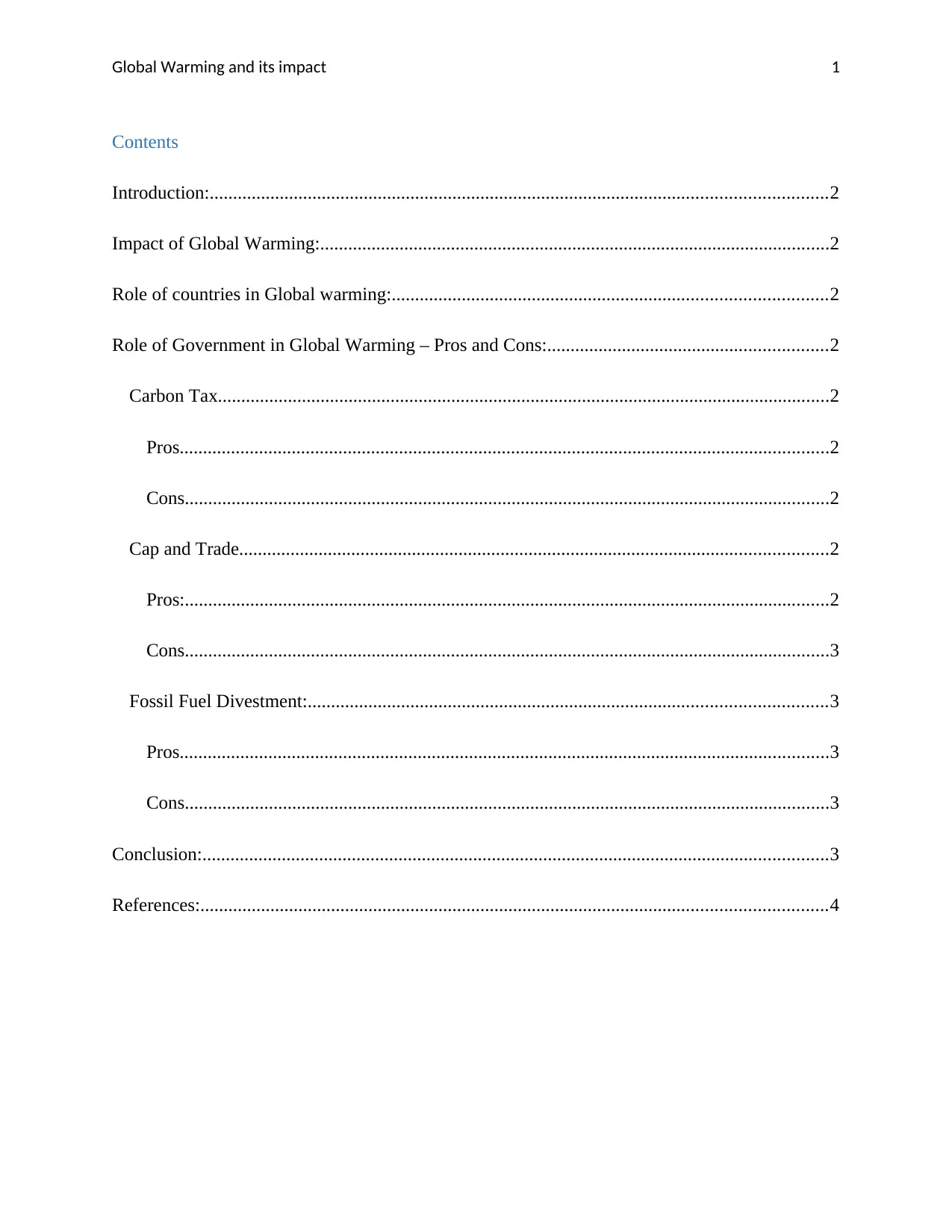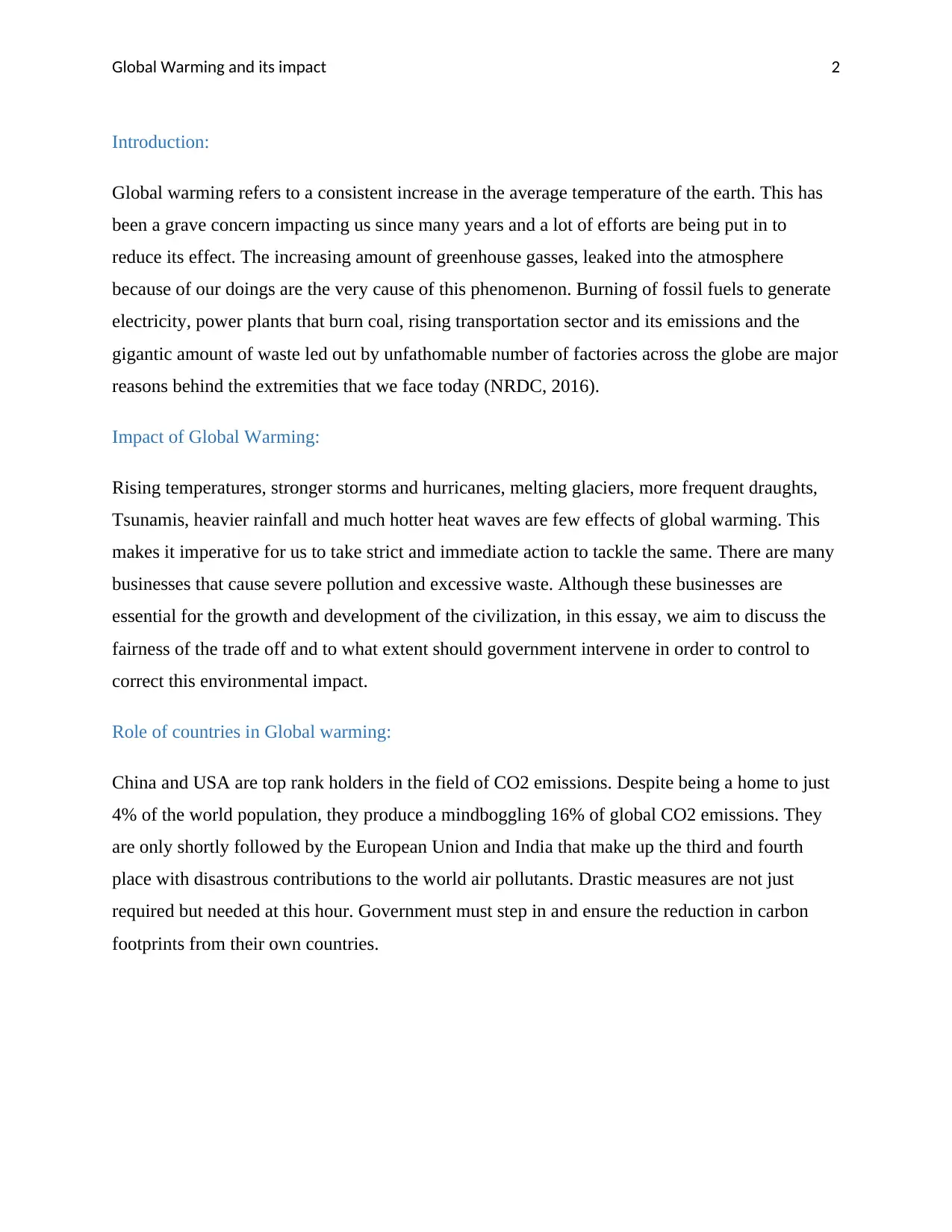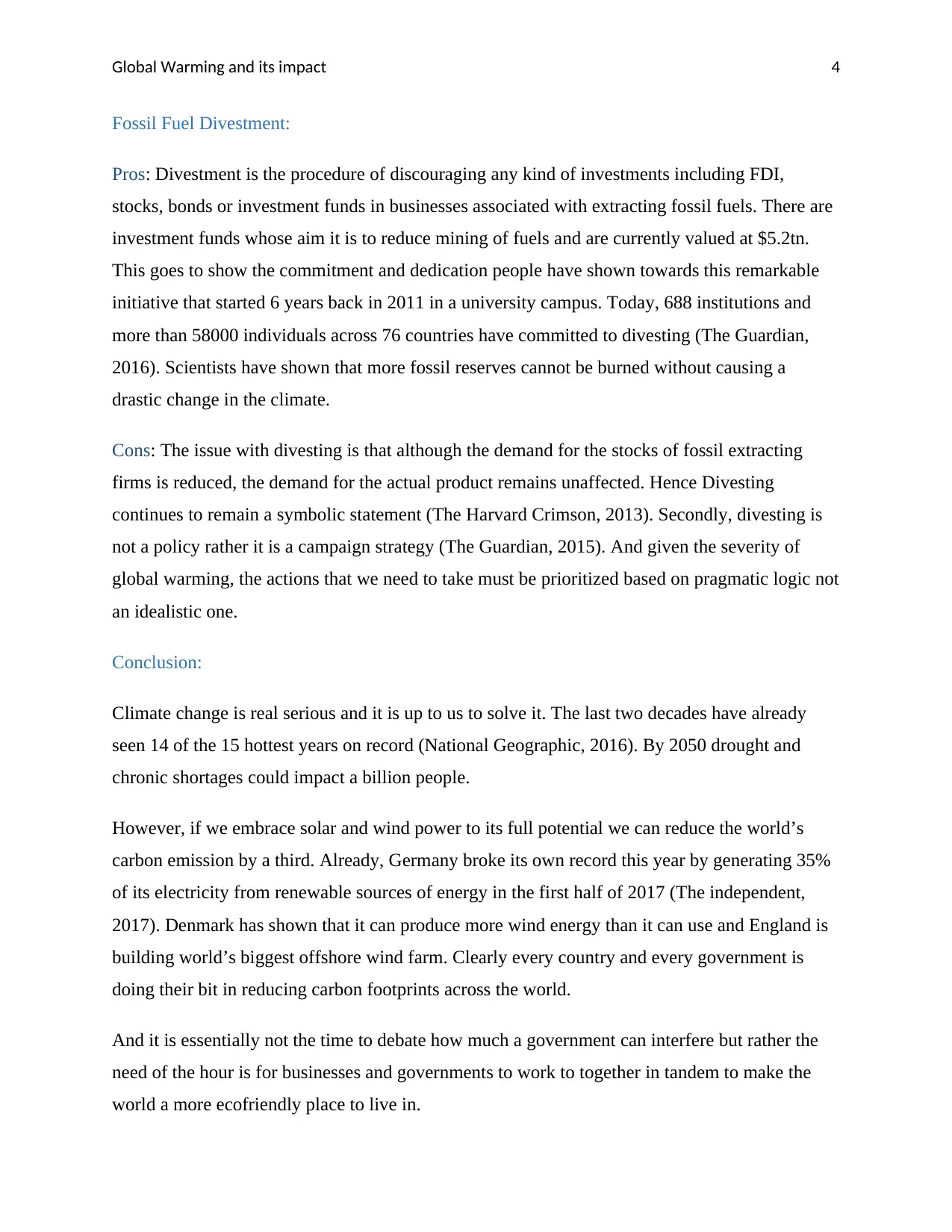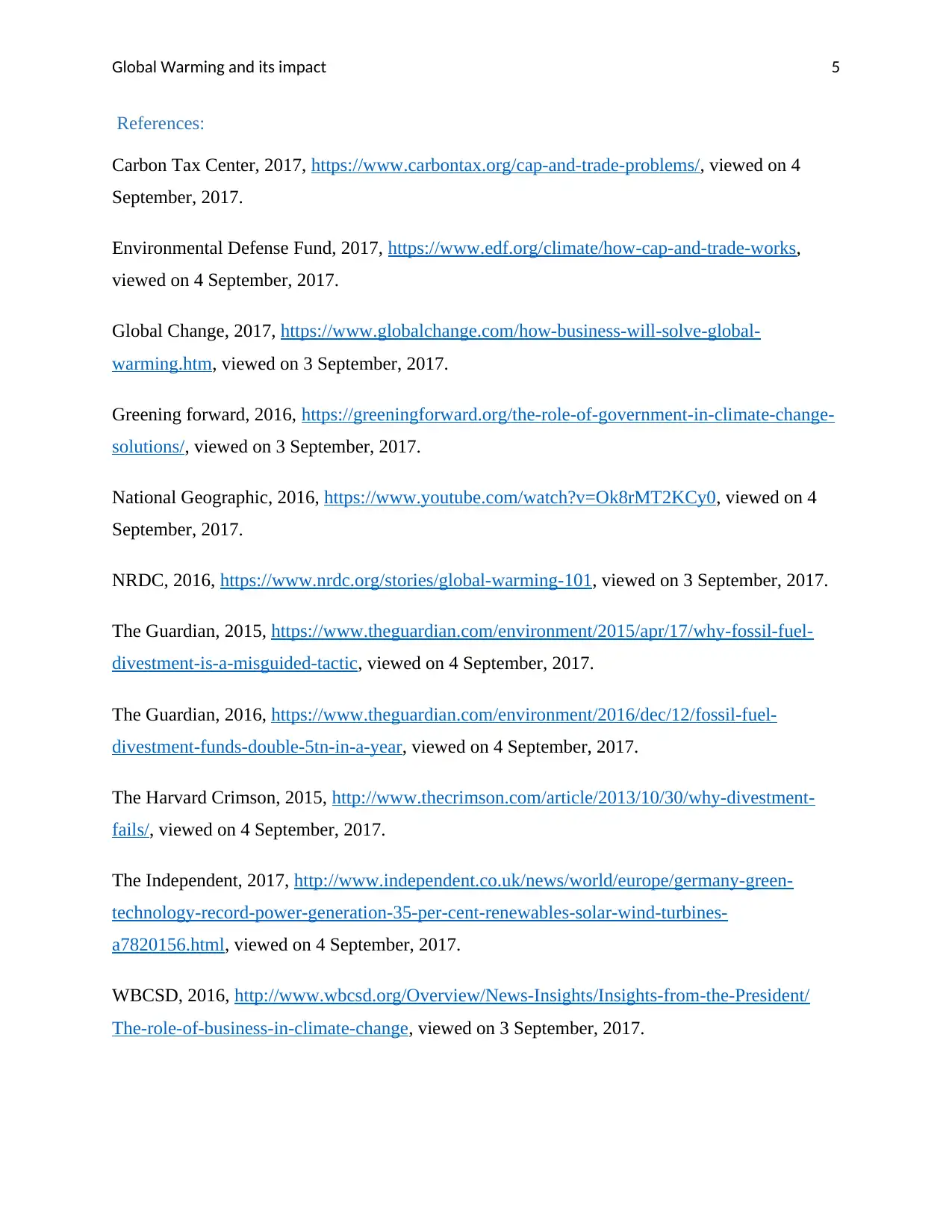Global Warming: Evaluating Government & Business Impact and Solutions
VerifiedAdded on 2020/02/24
|7
|1409
|135
Essay
AI Summary
This essay delves into the critical issue of global warming, examining its causes, impacts, and the roles of governments and businesses in addressing it. It begins by defining global warming and highlighting its detrimental effects, such as rising temperatures and extreme weather events. The essay then analyzes the responsibilities of countries, particularly the top CO2 emitters, and explores various government strategies to mitigate climate change. These strategies include carbon taxes, cap and trade systems, and fossil fuel divestment, with a critical examination of their pros and cons. The essay emphasizes the need for collaborative efforts between governments and businesses to create a more eco-friendly world, concluding with a call to action to embrace renewable energy and sustainable practices. The references provide supporting evidence from various sources to support the claims made in the essay.

Running Head: Global Warming and its impact
Global Warming
Government and business
Global Warming
Government and business
Paraphrase This Document
Need a fresh take? Get an instant paraphrase of this document with our AI Paraphraser

Global Warming and its impact 1
Contents
Introduction:....................................................................................................................................2
Impact of Global Warming:.............................................................................................................2
Role of countries in Global warming:.............................................................................................2
Role of Government in Global Warming – Pros and Cons:............................................................2
Carbon Tax...................................................................................................................................2
Pros...........................................................................................................................................2
Cons..........................................................................................................................................2
Cap and Trade..............................................................................................................................2
Pros:..........................................................................................................................................2
Cons..........................................................................................................................................3
Fossil Fuel Divestment:...............................................................................................................3
Pros...........................................................................................................................................3
Cons..........................................................................................................................................3
Conclusion:......................................................................................................................................3
References:......................................................................................................................................4
Contents
Introduction:....................................................................................................................................2
Impact of Global Warming:.............................................................................................................2
Role of countries in Global warming:.............................................................................................2
Role of Government in Global Warming – Pros and Cons:............................................................2
Carbon Tax...................................................................................................................................2
Pros...........................................................................................................................................2
Cons..........................................................................................................................................2
Cap and Trade..............................................................................................................................2
Pros:..........................................................................................................................................2
Cons..........................................................................................................................................3
Fossil Fuel Divestment:...............................................................................................................3
Pros...........................................................................................................................................3
Cons..........................................................................................................................................3
Conclusion:......................................................................................................................................3
References:......................................................................................................................................4

Global Warming and its impact 2
Introduction:
Global warming refers to a consistent increase in the average temperature of the earth. This has
been a grave concern impacting us since many years and a lot of efforts are being put in to
reduce its effect. The increasing amount of greenhouse gasses, leaked into the atmosphere
because of our doings are the very cause of this phenomenon. Burning of fossil fuels to generate
electricity, power plants that burn coal, rising transportation sector and its emissions and the
gigantic amount of waste led out by unfathomable number of factories across the globe are major
reasons behind the extremities that we face today (NRDC, 2016).
Impact of Global Warming:
Rising temperatures, stronger storms and hurricanes, melting glaciers, more frequent draughts,
Tsunamis, heavier rainfall and much hotter heat waves are few effects of global warming. This
makes it imperative for us to take strict and immediate action to tackle the same. There are many
businesses that cause severe pollution and excessive waste. Although these businesses are
essential for the growth and development of the civilization, in this essay, we aim to discuss the
fairness of the trade off and to what extent should government intervene in order to control to
correct this environmental impact.
Role of countries in Global warming:
China and USA are top rank holders in the field of CO2 emissions. Despite being a home to just
4% of the world population, they produce a mindboggling 16% of global CO2 emissions. They
are only shortly followed by the European Union and India that make up the third and fourth
place with disastrous contributions to the world air pollutants. Drastic measures are not just
required but needed at this hour. Government must step in and ensure the reduction in carbon
footprints from their own countries.
Introduction:
Global warming refers to a consistent increase in the average temperature of the earth. This has
been a grave concern impacting us since many years and a lot of efforts are being put in to
reduce its effect. The increasing amount of greenhouse gasses, leaked into the atmosphere
because of our doings are the very cause of this phenomenon. Burning of fossil fuels to generate
electricity, power plants that burn coal, rising transportation sector and its emissions and the
gigantic amount of waste led out by unfathomable number of factories across the globe are major
reasons behind the extremities that we face today (NRDC, 2016).
Impact of Global Warming:
Rising temperatures, stronger storms and hurricanes, melting glaciers, more frequent draughts,
Tsunamis, heavier rainfall and much hotter heat waves are few effects of global warming. This
makes it imperative for us to take strict and immediate action to tackle the same. There are many
businesses that cause severe pollution and excessive waste. Although these businesses are
essential for the growth and development of the civilization, in this essay, we aim to discuss the
fairness of the trade off and to what extent should government intervene in order to control to
correct this environmental impact.
Role of countries in Global warming:
China and USA are top rank holders in the field of CO2 emissions. Despite being a home to just
4% of the world population, they produce a mindboggling 16% of global CO2 emissions. They
are only shortly followed by the European Union and India that make up the third and fourth
place with disastrous contributions to the world air pollutants. Drastic measures are not just
required but needed at this hour. Government must step in and ensure the reduction in carbon
footprints from their own countries.
⊘ This is a preview!⊘
Do you want full access?
Subscribe today to unlock all pages.

Trusted by 1+ million students worldwide

Global Warming and its impact 3
Role of Government in Global Warming – Pros and Cons:
Government of individual countries must take responsibility for reduced greenhouse emissions
from their land. There are a number of steps that can be taken by the government to control such
sky rocketing amounts of gaseous emissions from factories.
Carbon Tax
Pros: Carbon tax can be levied on individuals and businesses to prevent them from unfathomable
waste that is produced every day (Greening Forward, 2016). This has already come to being in
British Columbia and Canada. Like every other tax, this tax also acts as an incentive for firms to
remarkably control the emancipation of greenhouse gases. Carbon tax is a successful strategy
provided it is implemented in the right manner.
Cons: The problem with Carbon tax is the tedious process of calculating it as well as the
controversial and debatable nature of this tax. More often than not the internal politics of a
country refrain the running government from brining about such reforming acts into place.
Cap and Trade
Pros: Cap and trade is one of the most effective and efficient ways of incentivizing businesses to
reduce pollution caused by them. ‘Cap’ is the amount of carbon dioxide that a business can emit,
any ejection beyond which will be penalized by the government. Every business gets allowances
in terms of the cap. This cap is either allocated directly by the government or auctioned and
bought by businesses. ‘Trade’ is what gives companies flexibility. If a particular company
reduces pollution faster, it can sell its allowances to another company. This is a huge incentive
for firms to innovate faster and reduce pollution not only by a considerable amount but also at a
rapid pace. One of the biggest contributor to greenhouse gases, China, has plans to launch this
practice this year (Environmental Defense Fund, 2017).
Cons: The problem with cap and trade is that the demand for fuels and electricity used by firms
is non elastic. Which means that this does not reduce if the prices go up. Also, unlike carbon tax,
cap and trade is limited to businesses and hence discourages carbon reduction efforts by
individuals (Carbon Tax, 2017).
Role of Government in Global Warming – Pros and Cons:
Government of individual countries must take responsibility for reduced greenhouse emissions
from their land. There are a number of steps that can be taken by the government to control such
sky rocketing amounts of gaseous emissions from factories.
Carbon Tax
Pros: Carbon tax can be levied on individuals and businesses to prevent them from unfathomable
waste that is produced every day (Greening Forward, 2016). This has already come to being in
British Columbia and Canada. Like every other tax, this tax also acts as an incentive for firms to
remarkably control the emancipation of greenhouse gases. Carbon tax is a successful strategy
provided it is implemented in the right manner.
Cons: The problem with Carbon tax is the tedious process of calculating it as well as the
controversial and debatable nature of this tax. More often than not the internal politics of a
country refrain the running government from brining about such reforming acts into place.
Cap and Trade
Pros: Cap and trade is one of the most effective and efficient ways of incentivizing businesses to
reduce pollution caused by them. ‘Cap’ is the amount of carbon dioxide that a business can emit,
any ejection beyond which will be penalized by the government. Every business gets allowances
in terms of the cap. This cap is either allocated directly by the government or auctioned and
bought by businesses. ‘Trade’ is what gives companies flexibility. If a particular company
reduces pollution faster, it can sell its allowances to another company. This is a huge incentive
for firms to innovate faster and reduce pollution not only by a considerable amount but also at a
rapid pace. One of the biggest contributor to greenhouse gases, China, has plans to launch this
practice this year (Environmental Defense Fund, 2017).
Cons: The problem with cap and trade is that the demand for fuels and electricity used by firms
is non elastic. Which means that this does not reduce if the prices go up. Also, unlike carbon tax,
cap and trade is limited to businesses and hence discourages carbon reduction efforts by
individuals (Carbon Tax, 2017).
Paraphrase This Document
Need a fresh take? Get an instant paraphrase of this document with our AI Paraphraser

Global Warming and its impact 4
Fossil Fuel Divestment:
Pros: Divestment is the procedure of discouraging any kind of investments including FDI,
stocks, bonds or investment funds in businesses associated with extracting fossil fuels. There are
investment funds whose aim it is to reduce mining of fuels and are currently valued at $5.2tn.
This goes to show the commitment and dedication people have shown towards this remarkable
initiative that started 6 years back in 2011 in a university campus. Today, 688 institutions and
more than 58000 individuals across 76 countries have committed to divesting (The Guardian,
2016). Scientists have shown that more fossil reserves cannot be burned without causing a
drastic change in the climate.
Cons: The issue with divesting is that although the demand for the stocks of fossil extracting
firms is reduced, the demand for the actual product remains unaffected. Hence Divesting
continues to remain a symbolic statement (The Harvard Crimson, 2013). Secondly, divesting is
not a policy rather it is a campaign strategy (The Guardian, 2015). And given the severity of
global warming, the actions that we need to take must be prioritized based on pragmatic logic not
an idealistic one.
Conclusion:
Climate change is real serious and it is up to us to solve it. The last two decades have already
seen 14 of the 15 hottest years on record (National Geographic, 2016). By 2050 drought and
chronic shortages could impact a billion people.
However, if we embrace solar and wind power to its full potential we can reduce the world’s
carbon emission by a third. Already, Germany broke its own record this year by generating 35%
of its electricity from renewable sources of energy in the first half of 2017 (The independent,
2017). Denmark has shown that it can produce more wind energy than it can use and England is
building world’s biggest offshore wind farm. Clearly every country and every government is
doing their bit in reducing carbon footprints across the world.
And it is essentially not the time to debate how much a government can interfere but rather the
need of the hour is for businesses and governments to work to together in tandem to make the
world a more ecofriendly place to live in.
Fossil Fuel Divestment:
Pros: Divestment is the procedure of discouraging any kind of investments including FDI,
stocks, bonds or investment funds in businesses associated with extracting fossil fuels. There are
investment funds whose aim it is to reduce mining of fuels and are currently valued at $5.2tn.
This goes to show the commitment and dedication people have shown towards this remarkable
initiative that started 6 years back in 2011 in a university campus. Today, 688 institutions and
more than 58000 individuals across 76 countries have committed to divesting (The Guardian,
2016). Scientists have shown that more fossil reserves cannot be burned without causing a
drastic change in the climate.
Cons: The issue with divesting is that although the demand for the stocks of fossil extracting
firms is reduced, the demand for the actual product remains unaffected. Hence Divesting
continues to remain a symbolic statement (The Harvard Crimson, 2013). Secondly, divesting is
not a policy rather it is a campaign strategy (The Guardian, 2015). And given the severity of
global warming, the actions that we need to take must be prioritized based on pragmatic logic not
an idealistic one.
Conclusion:
Climate change is real serious and it is up to us to solve it. The last two decades have already
seen 14 of the 15 hottest years on record (National Geographic, 2016). By 2050 drought and
chronic shortages could impact a billion people.
However, if we embrace solar and wind power to its full potential we can reduce the world’s
carbon emission by a third. Already, Germany broke its own record this year by generating 35%
of its electricity from renewable sources of energy in the first half of 2017 (The independent,
2017). Denmark has shown that it can produce more wind energy than it can use and England is
building world’s biggest offshore wind farm. Clearly every country and every government is
doing their bit in reducing carbon footprints across the world.
And it is essentially not the time to debate how much a government can interfere but rather the
need of the hour is for businesses and governments to work to together in tandem to make the
world a more ecofriendly place to live in.

Global Warming and its impact 5
References:
Carbon Tax Center, 2017, https://www.carbontax.org/cap-and-trade-problems/, viewed on 4
September, 2017.
Environmental Defense Fund, 2017, https://www.edf.org/climate/how-cap-and-trade-works,
viewed on 4 September, 2017.
Global Change, 2017, https://www.globalchange.com/how-business-will-solve-global-
warming.htm, viewed on 3 September, 2017.
Greening forward, 2016, https://greeningforward.org/the-role-of-government-in-climate-change-
solutions/, viewed on 3 September, 2017.
National Geographic, 2016, https://www.youtube.com/watch?v=Ok8rMT2KCy0, viewed on 4
September, 2017.
NRDC, 2016, https://www.nrdc.org/stories/global-warming-101, viewed on 3 September, 2017.
The Guardian, 2015, https://www.theguardian.com/environment/2015/apr/17/why-fossil-fuel-
divestment-is-a-misguided-tactic, viewed on 4 September, 2017.
The Guardian, 2016, https://www.theguardian.com/environment/2016/dec/12/fossil-fuel-
divestment-funds-double-5tn-in-a-year, viewed on 4 September, 2017.
The Harvard Crimson, 2015, http://www.thecrimson.com/article/2013/10/30/why-divestment-
fails/, viewed on 4 September, 2017.
The Independent, 2017, http://www.independent.co.uk/news/world/europe/germany-green-
technology-record-power-generation-35-per-cent-renewables-solar-wind-turbines-
a7820156.html, viewed on 4 September, 2017.
WBCSD, 2016, http://www.wbcsd.org/Overview/News-Insights/Insights-from-the-President/
The-role-of-business-in-climate-change, viewed on 3 September, 2017.
References:
Carbon Tax Center, 2017, https://www.carbontax.org/cap-and-trade-problems/, viewed on 4
September, 2017.
Environmental Defense Fund, 2017, https://www.edf.org/climate/how-cap-and-trade-works,
viewed on 4 September, 2017.
Global Change, 2017, https://www.globalchange.com/how-business-will-solve-global-
warming.htm, viewed on 3 September, 2017.
Greening forward, 2016, https://greeningforward.org/the-role-of-government-in-climate-change-
solutions/, viewed on 3 September, 2017.
National Geographic, 2016, https://www.youtube.com/watch?v=Ok8rMT2KCy0, viewed on 4
September, 2017.
NRDC, 2016, https://www.nrdc.org/stories/global-warming-101, viewed on 3 September, 2017.
The Guardian, 2015, https://www.theguardian.com/environment/2015/apr/17/why-fossil-fuel-
divestment-is-a-misguided-tactic, viewed on 4 September, 2017.
The Guardian, 2016, https://www.theguardian.com/environment/2016/dec/12/fossil-fuel-
divestment-funds-double-5tn-in-a-year, viewed on 4 September, 2017.
The Harvard Crimson, 2015, http://www.thecrimson.com/article/2013/10/30/why-divestment-
fails/, viewed on 4 September, 2017.
The Independent, 2017, http://www.independent.co.uk/news/world/europe/germany-green-
technology-record-power-generation-35-per-cent-renewables-solar-wind-turbines-
a7820156.html, viewed on 4 September, 2017.
WBCSD, 2016, http://www.wbcsd.org/Overview/News-Insights/Insights-from-the-President/
The-role-of-business-in-climate-change, viewed on 3 September, 2017.
⊘ This is a preview!⊘
Do you want full access?
Subscribe today to unlock all pages.

Trusted by 1+ million students worldwide

Global Warming and its impact 6
1 out of 7
Related Documents
Your All-in-One AI-Powered Toolkit for Academic Success.
+13062052269
info@desklib.com
Available 24*7 on WhatsApp / Email
![[object Object]](/_next/static/media/star-bottom.7253800d.svg)
Unlock your academic potential
Copyright © 2020–2026 A2Z Services. All Rights Reserved. Developed and managed by ZUCOL.




